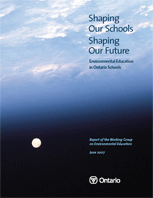The Ministry of Education’s policy framework, Acting Today, Shaping Tomorrow (February 2009) quotes the vision of environmental education, first articulated in its 2007 working group report:
Ontario’s education system will prepare students with the knowledge,
skills, perspectives, and practices they need to be environmentally
responsible citizens. Students will understand our fundamental
connections to each other and to the world around us through our
relationship to food, water, energy, air, and land, and our interaction
with all living things. The education system will provide opportunities
within the classroom and the community for students to engage in actions
that deepen this understanding.
Shaping Our Schools, Shaping Our Future, p. 4
The Ministry has adopted the report’s comprehensive definition of environmental education:


Environmental education is education about the environment, for the environment, and in the environment that promotes an understanding of, rich and active experience in, and an appreciation for the dynamic interactions of:
- The Earth’s physical and biological systems
- The dependency of our social and economic systems on these natural systems
- The scientific and human dimensions of environmental issues
- The positive and negative consequences, both intended and unintended, of the interactions between human-created and natural systems
Being ecologically literate entails a new way of seeing
the world and a new way of thinking,
known as systems thinking, or systemic thinking.
It means thinking in terms of relationships,
connectedness and context.